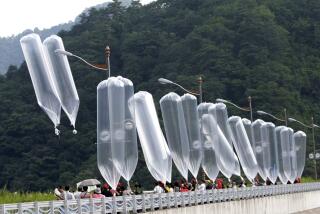How Hard Should Clinton Push It? : Volatile Pyongyang eludes nuclear inspections
- Share via
Washington is rapidly running out of options and inducements as it tries to get North Korea to agree to international inspection of its nuclear facilities.
President Clinton is now mulling a recommendation from his top national security advisers that he offer to drop the U.S.-South Korea annual military exercises scheduled for next spring in exchange for Pyongyang’s agreement to let officials from the International Atomic Energy Agency have a look at certain of its nuclear plants. Suspension of the exercises, long demanded by the north, would not pose any risk to South Korea’s security. But would this offer be enough to get North Korea to meet its obligations as a signatory to the Non-proliferation Treaty?
The history of nuclear negotiations with Pyongyang isn’t encouraging. Each carrot proffered by Washington in those talks--they have included a pledge of non-aggression and proposals for economic, trade and technical aid--has been deemed insufficient by Kim Il Sung’s Stalinist regime. The feeling grows that North Korea has no intention of trading its nuclear weapons plans for anything the United States and its allies can reasonably and honorably offer. If that’s the case, Washington runs the risk of simply looking weak if it continues to propose new concessions.
The trouble is that mobilizing international support for taking tougher action against the north will be anything but easy. South Korea and Japan have cautioned that Pyongyang might react explosively if put under pressure. China similarly urges sticking with diplomatic approaches. Clinton will confer with the leaders of all three countries at the Asia Pacific Economic Cooperation meeting in Seattle this week. As a practical matter he would need the support--or at least the tacit concurrence--of all for any new measures he might take, including seeking U.N. Security Council sanctions to try to force the north into compliance with the Non-proliferation Treaty.
The great global concern arising from this dispute has to do with the example that North Korea’s defiance of the treaty could set for other countries with nuclear weapons ambitions, Iran among them. The great regional worry is that a nuclearized North Korea would drastically upset the security and stability of all of Northeast Asia.
South Korea’s President Kim Young Sam said in a Times interview Sunday that although his country will not develop nuclear weapons even if the north does so, he believes that Japan might feel compelled to. That bleak possibility can’t be ruled out. Thus, decisions made in Pyongyang could well determine whether Northeast Asia is soon to be the site of an ominous new arms race.
More to Read
Sign up for Essential California
The most important California stories and recommendations in your inbox every morning.
You may occasionally receive promotional content from the Los Angeles Times.










